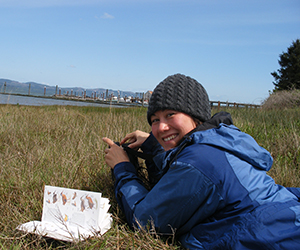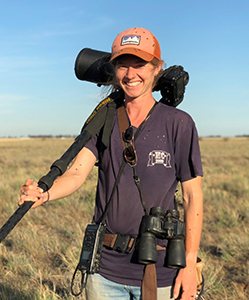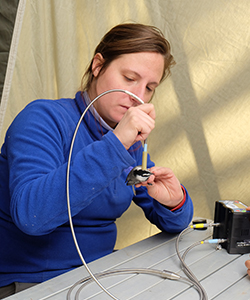The American Ornithological Society (AOS) is pleased to announce the awardees of the inaugural 2020 Kessel Research Fellowship for early career scientists. Three new $15,000 fellowships were awarded to Dr. Laura Farwell, Dr. Allison Johnson, and Dr. Carrie Branch to support their ornithological research. Congratulations to these awardees! These fellowships have been made possible through a generous bequest by Dr. Brina Kessel and support the full range of ornithological research currently published in peer-reviewed journals, such as avian biology, ecology, behavior, conservation, genetics, and interdisciplinary work. Read more about the research projects being funded by this year’s Kessel Research Fellowships.

Dr. Laura Farwell, Postdoctoral Researcher, University of Wisconsin–Madison
Project: “Breeding passerine response to climate-driven expansion of shrubs and trees in the Alaskan subarctic”
Dr. Laura Farwell is a landscape and wildlife ecologist who is broadly interested in impacts of global change on species distributions and community interactions. As a postdoctoral researcher, she is developing a suite of remote sensing habitat indices that can predict large-scale patterns of bird diversity. She previously studied impacts of shale gas development on forests and songbird communities in the central Appalachian region, and shifting avian community dynamics in urbanizing landscapes in the Pacific Northwest. As a Kessel Fellow, Dr. Farwell will investigate effects of climate-driven expansion of woody vegetation in subarctic tundra habitats. Arctic and subarctic regions are warming at more than twice the rate of the global average, leading to a rapid expansion of shrubs and trees in tundra ecosystems. Wildlife distributions are expected to shift towards range limits in response to climate-driven habitat changes. However, many species that breed in arctic and subarctic regions are already at the limits of their bioclimatic and geographic ranges, raising concerns about the implications of changing vegetation in these regions for biodiversity. Dr. Farwell’s research will focus on shifting distributions and densities of breeding songbirds in Denali National Park over a 20-year period, using historic survey data and planned resurveys of these sites. Results will fill an important knowledge gap regarding how species are responding to climate-driven changes in the structure and composition of vegetation at high latitudes. Dr. Farwell looks forward to conducting research in Denali, where she first discovered a passion for birds and conservation 15 years ago. She is also honored to apply this award towards research in Alaska, where Dr. Brina Kessel blazed so many trails.

Dr. Allison Johnson, Postdoctoral Researcher, School of Biological Sciences, University of Nebraska-Lincoln
Project: “Ecology of social organization in cooperatively breeding birds”
Dr. Allison Johnson is a behavioral ecologist, whose work seeks to understand the interplay between ecology, life history, and sociality. She received her master’s degree and Ph.D. while working with Dr. Stephen Pruett-Jones from the University of Chicago in 2013 and 2016, respectively, and is currently a postdoctoral researcher working with Dr. Daizaburo Shizuka at the University of Nebraska-Lincoln. Growing up in Nebraska, Dr. Johnson spent springs watching sandhill cranes migrate through the Platte River Basin, an experience which sparked her early interest in ornithology. Her first field job, with Drs. Charles Brown and Mary Bomberger Brown, examined how ectoparasite and disease load relates to cliff swallow colony size. The gregarious nature of these small, agile birds solidified her love of ornithology and started her on the path to becoming a behavioral ecologist. Her graduate and continuing postdoctoral research focus on avian social complexity, and she is currently working with Australian bird communities to investigate how social interaction within and between species impacts survival, reproductive behavior, and foraging behavior, in addition to how communication and individual recognition are used to mediate such varied social interactions. Through her position at the University of Nebraska-Lincoln, she has been able to help mentor graduate students investigating patterns of individual association across species, and the role that patterns of association (both at an individual and species level) play in impacting likelihood of infection by malarial parasites. In addition to her longitudinal studies, Dr. Johnson is collaborating with Joseph Welklin to address how environment, resource limitation, and social benefits interact to generate ecogeographic variation in social behavior across cooperatively breeding fairywrens through both field studies and through the Fairywren Project, their citizen science project.

Dr. Carrie Branch, Rose Postdoctoral Fellow, Cornell Lab of Ornithology
Project: “Connecting signaling, cognition, and female choice in wild bird”
Dr. Carrie Branch is a behavioral ecologist interested in the evolution of signaling and cognition in birds. She received her B.A. in Psychology at the University of Tennessee in 2009, where she discovered her love for animal behavior and avian communication working with Parids under Dr. Todd Freeberg. She then went on to the University of North Carolina, Wilmington to complete a M.A. in Experimental Psychology (2012) investigating animal cognition in rats under Dr. Kate Bruce. Dr. Branch was able to combine her interests in communication and cognition to complete her PhD in Ecology, Evolution, and Conservation Biology in 2018 at the University of Nevada under the advisement of Dr. Vladimir Pravosudov. Her doctoral work focused on the role females play in maintaining local adaptation between mountain chickadees (Poecile gambeli) inhabiting differentially harsh environments. Dr. Branch is currently a Rose Postdoctoral Fellow at the Cornell Lab of Ornithology investigating the association between male secondary sexual signals and their spatial cognitive abilities, with the goal of understanding who females choose as extra-pair mates, and whether these choices may result in females producing offspring with enhanced cognitive abilities — all in free-living birds. To date, Dr. Branch has authored and co-authored 31 articles in peer-reviewed journals including, Animal Behaviour, Behavioral Ecology, Current Biology, Ecology Letters, Royal Society Open Science, and Proceedings B. Dr. Branch is strongly committed to broader impacts, including mentoring undergraduates and participating in outreach with the community. In total, she has involved 15 undergraduates in her research across three universities. She participates in various outreach activities including leading nature walks with community members, participating in panel discussions, conducting bird banding demonstrations, and teaching lessons to K–12 students based on her research.